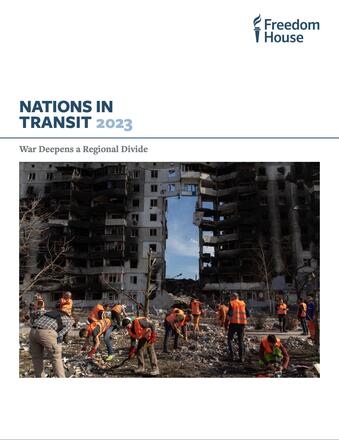
The Nations in Transit 2023 report presents a somber assessment of democratic governance across Central Europe to Central Asia, marking the 19th consecutive year of decline. Amid Russia's invasion of Ukraine, autocratic regimes persistently eroded institutional independence in media, local governance, and civil society. Ukraine held firm in its commitment to liberal democracy, while Russia's repression of dissent reached worrying levels. Illiberal populism posed challenges in European Union member states, particularly in Hungary and Poland, but signs of democratic resilience emerged in Slovenia and Czechia. Consolidated Authoritarian Regimes witnessed further declines, marked by deadly consequences of authoritarian misrule, such as the Russian invasion of Ukraine and violent suppression of protests in Central Asia.
Key findings:
- Autocrats continued to erode institutional independence, with Democracy Scores declining in 11 out of 29 countries in the report, while 7 countries showed improvements.
- Ukraine maintained its commitment to liberal democracy amid the war, while Russia's repression of dissent intensified. Russia's Democracy Score recorded the largest single-year drop in the report's history.
- Illiberal populism had varying impacts in European Union member states. Hungary's autocratization and Poland's illiberal agenda are challenging democratic standards, while the electoral repudiation of populist and illiberal leaders in Slovenia and Czechia demonstrates democracy's potential for self-correction.
- 10 non-EU Hybrid Regimes showed more improvements than declines, but the drawn-out EU accession processes in the Western Balkans generated disillusionment.
- Consolidated Authoritarian Regimes faced further declines in their Democracy Scores, with six of the eight countries experiencing worsening conditions. The Russian invasion of Ukraine, Azerbaijani incursions into Armenia, and the violent suppression of protests in Central Asia highlighted the deadly consequences of authoritarian rule.
The content of this article can be used according to the terms of Creative Commons: Attribution-NonCommercial 4.0 International (CC BY-NC 4.0) . To do so use the the wording "this article was originally published on the Resource Centre on Media Freedom in Europe" including a direct active link to the original article page.

